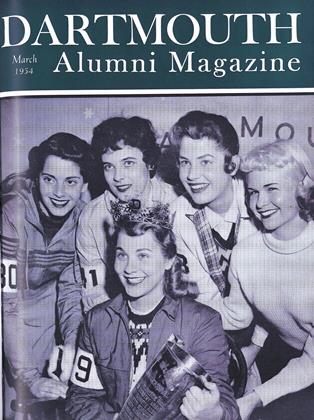Although the official announcement did not say so outright, an Ivy League in football is now formally in existence.
Through Dr. Grayson Kirk, president of Columbia University, the presidents of the eight Ivy Group institutions announced on February 10 the adoption of a round-robin schedule whereby each team Will meet all seven of the other teams in the Group each season. With 1954 and 1955 schedule commitments to be honored, the league will not get fully into swing until 1956.
The plan was adopted by the presidents of Brown, Columbia, Cornell, Dartmouth, Harvard, Pennsylvania, Princeton and Yale at their meeting in December, but announcement was held up pending approval by the governing boards of the institutions. Approval was voted by the Dartmouth Board of Trustees at its meeting in Hanover on January 8.
The principle of round-robin scheduling in sports other than football was also approved by the Presidents' Policy Committee, but this action, further strengthening the Ivy League pact, in reality gave official blessing to a state of affairs that already exists in the other sports. The presidents also reaffirmed the ban on spring practice and post-season football games for both players and coaches, continued the strict code of eligibility standards, including prohibition of athletic scholarships, and in general gave fresh backing to the Ivy Group agreement that was first drawn up in 1945.
Dr. Kirk's announcement disclosed two new restrictions adopted by the Presidents' Policy Committee. In addition to prohibiting participation in post-season football clinics, the agreement now bans the endorsement of commercial products by coaches, "in conformity with customary practices of other academic officers." It also bans undergraduate participation in post-season or pre-season all-star games in any sport—a restriction that applied previously to football alone. Specifically exempted, however, are "international competitions such as the games, meets and matches with Oxford and Cambridge Universities," and also competitions under the National Collegiate Athletic Association, the Eastern Collegiate Athletic Conference, and the A.A.U.
"No student entering after September 1, 1953," says the agreement, "shall be eligible whose secondary school education was subsidized or whose post-college education is promised by an institution or group of individuals not closely related to the family as a consideration for his attending the particular institution."
With football schedules limited to nine games, and seven of these to be played against Ivy League opponents beginning in 1956, the Ivy institutions will each have only two "free electives" in making up their football slates. This situation will have its effect on other teams in the East that have regularly been playing Ivy opponents, and it has already been proposed that a new Eastern league be formed by some of the teams making up this non-Ivy group.
As in previous years, three inter-institutional committees will serve to carry out the cooperative purposes of the Ivy Group Agreement. These are the Presidents' Policy Committee, on which President Dickey represents Dartmouth; the Administrative Committee, on which Dartmouth is represented by William H. McCarter '19, to be succeeded by Robert A. Rolfe '31 when he takes over as Director of Athletics on July 1; and the Eligibility Committee, on which Dartmouth's representative is Dean Joseph L. McDonald. Dr. Kirk currently is chairman of the policy committee and thus made the announcement concerning the round-robin schedule in football.
An Ivy League in football has been evolving for more than fifty years. The eight teams in the group have been playing each other regularly since the 1890's and the youngest rivalry within the group, Brown vs. Columbia, is 52 years old. A total of 976 games have been played between the Ivy foes, starting with the Columbia-Yale game of 1872. Yale has been most successful down through the years, with 190 Ivy victories. Dartmouth's alltime Ivy League record is 99 won, 130 lost and 14 tied. By odd coincidence, the alltime precentages run in reverse alphabetical order: Yale .653, Princeton .618, Pennsylvania .593, Harvard .539, Dartmouth 4362, Cornell 4357, Columbia .314 and Brown .257.
 View Full Issue
View Full Issue
More From This Issue
-
 Feature
FeatureHow Much Government?
March 1954 By LAURENCE I. RADWAY -
 Feature
FeatureIn the Public Eye
March 1954 By FRANCIS BROWN '25, -
 Class Notes
Class Notes1929
March 1954 By F. WILLIAM ANDRES, EDWIN C. CHINLUND -
 Class Notes
Class Notes1918
March 1954 By ERNEST H. EARLEY, W. CURTIS GLOVER, RICHARD P. WHITE -
 Class Notes
Class Notes1926
March 1954 By HERBERT H. HARWOOD, H. DONALD NORSTRAND, CARLETON BLUNT -
 Class Notes
Class Notes1952
March 1954 By LT. (JC) ROBERT D. BRACE, ENS. DONALD E. MACLEOD







